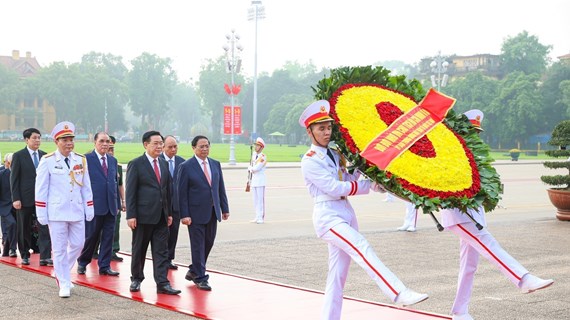Malaysia set to use nuclear power by 2025
Malaysia is planning to use nuclear power as an alternative energy source by 2025, a government official said on July 23.
Malaysia is planning to use nuclear power as an alternative energy source by 2025, a government official said on July 23.
The government has given the go-ahead to the nuclear policy and will link up with international organisations, such as the United Nations (UN) and the International Atomic Energy Agency (IAEA), Malaysian Deputy Minister of Science, Technology and Innovation, Fadillah Yusof, said.
According to the official, Malaysia now utilises natural gas to generate 60 percent of its electricity; coal accounts for 24 percent, while hydroelectric and biomass power accounts for the remaining sources.
Yusof said although the initial costs for a 1,000-megawatt capacity nuclear plant in Malaysia ranges between 1 billion and 3 billion USD - about twice the amount of a coal-fuelled plant - it is still cheaper than coal over the long term.
Economically, nuclear energy is the cheapest, and most environmentally friendly, with no pollutants produced, he said, adding that it will only produce waste after 20 years.
However, Ravi Krishnaswamy, an energy analyst for Frost & Sullivan, said recently that Malaysia will face a number of challenges in pursuing nuclear energy.
Malaysia lacks trained professionals and the capability to handle the technology, and also it faces the possible risks of mishandling and theft of radioactive nuclear material, he elaborated.
Krishnaswamy said that financially, a nuclear power plant is not in Malaysia 's favour. Countries like India and China with huge populations and limited domestic energy, for example, can more easily justify nuclear power's expense.
Such nations have potential to generate around 25 percent of their electricity output from nuclear power and still be able to build and replace nuclear reactors every 10 years, he noted./.
The government has given the go-ahead to the nuclear policy and will link up with international organisations, such as the United Nations (UN) and the International Atomic Energy Agency (IAEA), Malaysian Deputy Minister of Science, Technology and Innovation, Fadillah Yusof, said.
According to the official, Malaysia now utilises natural gas to generate 60 percent of its electricity; coal accounts for 24 percent, while hydroelectric and biomass power accounts for the remaining sources.
Yusof said although the initial costs for a 1,000-megawatt capacity nuclear plant in Malaysia ranges between 1 billion and 3 billion USD - about twice the amount of a coal-fuelled plant - it is still cheaper than coal over the long term.
Economically, nuclear energy is the cheapest, and most environmentally friendly, with no pollutants produced, he said, adding that it will only produce waste after 20 years.
However, Ravi Krishnaswamy, an energy analyst for Frost & Sullivan, said recently that Malaysia will face a number of challenges in pursuing nuclear energy.
Malaysia lacks trained professionals and the capability to handle the technology, and also it faces the possible risks of mishandling and theft of radioactive nuclear material, he elaborated.
Krishnaswamy said that financially, a nuclear power plant is not in Malaysia 's favour. Countries like India and China with huge populations and limited domestic energy, for example, can more easily justify nuclear power's expense.
Such nations have potential to generate around 25 percent of their electricity output from nuclear power and still be able to build and replace nuclear reactors every 10 years, he noted./.












